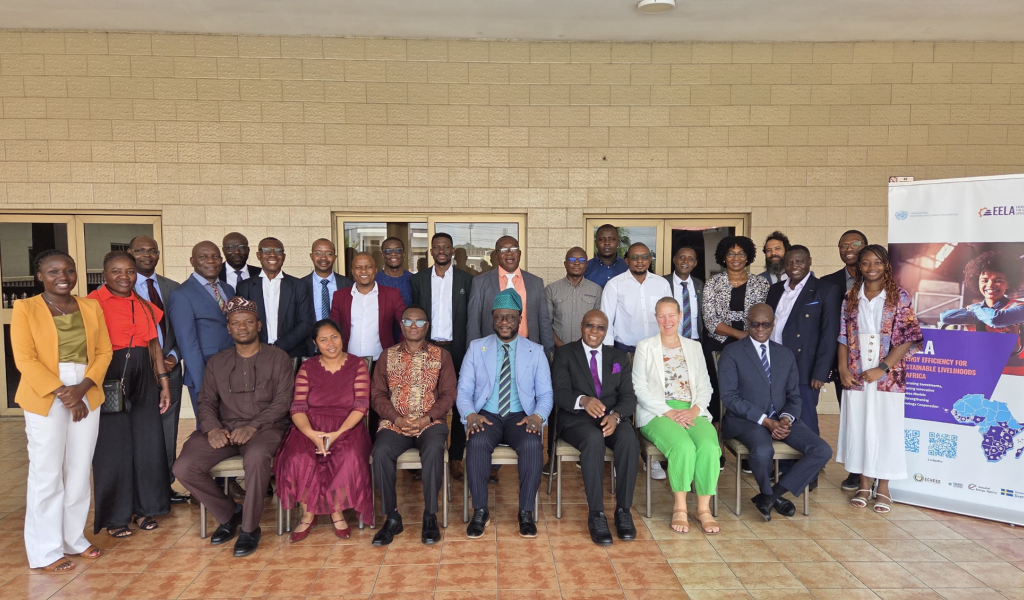News
EELA Regional Holds Second Regional Steering Committee Meeting in Accra to Advance Energy Efficiency Goals

On October 24, 2025, stakeholders from across Africa convened in Accra, Ghana, for the second regional Steering Committee meeting of the EELA Regional. The gathering brought together the management and technical leads of the program’s affiliated Energy Efficiency Centres — EACREEE, ECREEE, and SACREEE — along with the donor agency Sida, the EELA Project Management Unit, and high-level representatives from government agencies, regional bodies, and energy-sector organizations across the continent.
Participants included delegates from the Federal Ministry of Power of Nigeria, the Presidential Initiative on Climate Change, Renewable Energy and Food Security (Sierra Leone), Ghana's Energy Commission and Energy Foundation, the SADC Secretariat (Botswana), and the SADC Chair (Madagascar). Also present were representatives from RERA (Namibia), SAPP (Zimbabwe), TAREA (Tanzania), RAERESA (Zambia), the EAC Secretariat (Uganda), the East African Renewable Energy Federation (Rwanda), the Energy Regulators Association of East Africa (Tanzania), and the East African Power Pool (Ethiopia).
The meeting focused on three key objectives: reviewing implementation progress of the first-year work plan, presenting the draft work plan for year two, and collaboratively addressing emerging challenges as the program advances its mission to strengthen energy efficiency across the African continent.
Strengthening Regional Synergies
In their opening remarks, several stakeholders emphasized how EELA’s regional approach is creating significant opportunities to scale up energy efficiency impacts across Africa. Mr. Goddy Muhanguzi Muhumuza, EACREEE Executive Director representing EAC Secretariat, noted: “I believe that today we have set the direction of the project to address the energy efficiency gaps in the regions.” He added, “We are not only focusing on energy security, but also on energy trade. That’s what we want to move toward: not just generating energy for our own use but also enabling energy trade in the future”. He commented on the clarity of the data presented: “Your figures are very clear, and we appreciate how you have illustrated the picture while emphasizing the importance of investment for countries across the region to invest not only in energy generation, but also in energy efficiency. Thank you as well for providing a policy framework that reflects the realities of your region”.
Ms. Caroline Bastholm from Sida reinforced the donor’s commitment: “Since 2019, Sida has been a strong supporter of EELA. Over the last years, we have seen remarkable achievements and results in the development of harmonized standards, testing, and adoption of energy efficiency measures. Given that energy efficiency is one of the most efficient ways of making energy available for equal purposes, and that energy is prerequisite for economic development, this program is perfectly aligned with SIDA’s mission, which is to contribute to reduce global poverty.”. Across the interventions, speakers highlighted the importance of stronger coordination among diverse entities and frameworks to ensure harmonized progress and avoid duplication of efforts.
Mr. Tidiane Boye, UNIDO Representative in Côte d'Ivoire, stated: “Today, let us reaffirm our shared commitment to accelerate the implementation of harmonized MEPS and compliance frameworks, scale up financing and private sector participation, build capacity, and ensure inclusivity so that women, youth, and vulnerable communities benefit from these interventions. Together, we can make energy efficiency a catalyst for industrial transformation, climate resilience, and economic prosperity in Africa”.
Key Achievements Over the Past Six Months
Following the formal approval of the agenda, the EELA Project Management Unit presented the program’s major achievements since the last meeting:
- Coordination: Focal point and expert partner meetings were held to strengthen collaboration and knowledge sharing.
- High-Level Launch: EELA was officially launched in the presence of UNIDO Director General Gerd Müller, reinforcing global support for the initiative.
- Regional Engagement: Active participation in flagship events such as SADC Industrialization Week 2025, ECOWAS Sustainable Energy Week 2025, and SADC Sustainable Energy Week in Botswana.
- Regional and/or National Policy Progress: Publication of Minimum Energy Performance Standards (MEPS) for air conditioners in the EAC region; Enforcement of MEPS for air conditioning in Mauritius; MEPS review process initiated within ECOWAS.
- Private Sector Support: Two well-attended webinars were organized to strengthen the capacity of private stakeholders and promote energy-efficient services and products.
- National Compliance Efforts: Seminars were conducted or scheduled in Madagascar (July) and Uganda (October) to support adoption and compliance with EE standards.
- Communication and Outreach: Engagement metrics across EELA’s digital platforms showed significant growth, reflecting increased visibility and stakeholder interest.
Looking Ahead: Work Plan for 2026
The meeting also introduced a preliminary work plan for 2026, outlining key priorities such as participation in major regional and international energy efficiency events, the expansion of EELA’s e-learning platform with more specialized courses, and the completion of an ongoing assessment on industrial motor efficiency to inform future MEPS development. Plans also include the procurement of testing equipment for an ECOWAS-based laboratory and enhanced support for private sector actors through targeted financing and investment facilitation. Strategic discussions among committee members focused on energy efficiency markets, compliance, and affordability, with Mr. Tshikovhi emphasizing the need for cost-effective products to boost market penetration. The EELA team was widely praised for its progress, particularly the development of national windows, which was recognized as a significant step toward localized implementation.
Other topics discussed during the meeting included the harmonization of regional MEPS, labelling, and compliance requirements, the need for thorough documentation of private sector activities through dedicated reports, and the promotion of clean cooking solutions to address environmental and social challenges. The meeting closed with an agreement on EELA next steps, notably the decision to hold the next Steering Committee meeting virtually in the second quarter of 2026, followed by an in-person session later in the year. Participants reaffirmed their commitment to collaboration, supported by the Swedish Government, to overcome testing challenges and accelerate the adoption of energy-efficient technologies across the continent.